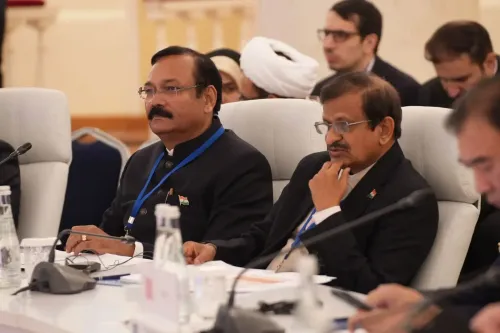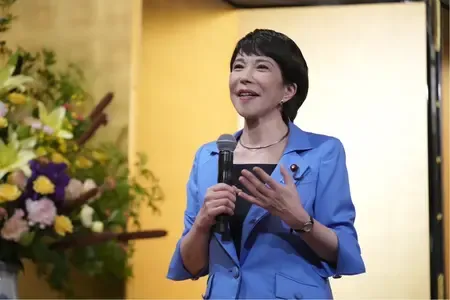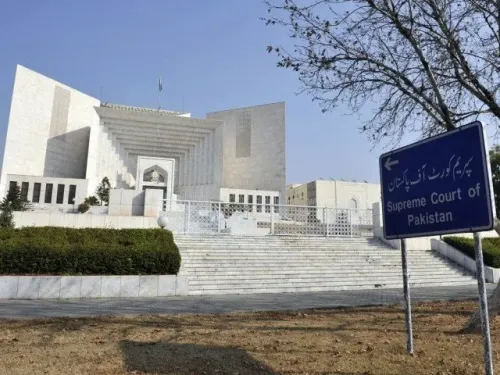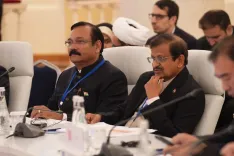What Key Points Were Highlighted in the Kuala Lumpur Declaration at the 20th East Asia Summit?
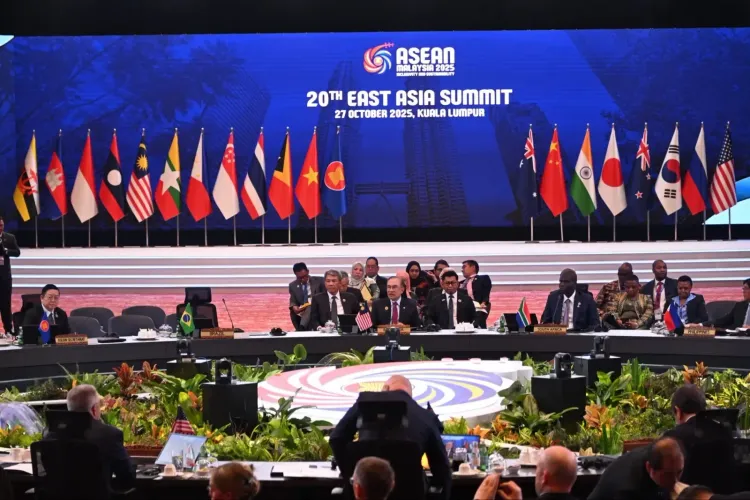
Synopsis
Key Takeaways
- Commitment to Peace: Strong emphasis on maintaining peace and stability in East Asia.
- Collective Action: Recognition of the need for countries to work together to address common challenges.
- ASEAN's Central Role: Reaffirmation of ASEAN's leadership and centrality in fostering regional cooperation.
- International Law: Commitment to upholding international law and mutual respect among nations.
- Future Cooperation: Focus on enhancing economic ties and sustainable development initiatives.
Kuala Lumpur, Oct 28 (NationPress) The Kuala Lumpur Declaration reaffirmed the unwavering commitment of participating nations to the 2005 Kuala Lumpur Declaration on the East Asia Summit, which established the broad vision, principles, objectives, and modalities of the EAS.
Additionally, it reiterated their dedication to the 2010 Ha Noi Declaration celebrating the fifth anniversary of the EAS, the 2015 Kuala Lumpur Declaration marking the tenth anniversary, and the 2020 Ha Noi Declaration celebrating the fifteenth anniversary.
The declaration acknowledged the numerous geopolitical tensions and conflicts the world and the region are currently facing, alongside economic uncertainties, security threats, and various transboundary challenges. It emphasized that addressing these issues necessitates collective collaboration and joint efforts to ensure enduring peace, social development, and economic advancement for all.
Reiterating the region's shared commitment to the goals and principles outlined in the Charter of the United Nations, the ASEAN Charter, and the Treaty of Amity and Cooperation in Southeast Asia (TAC), the declaration also referenced the 2005 Kuala Lumpur Declaration on the East Asia Summit and the 2011 Declaration of the East Asia Summit on the Principles for Mutually Beneficial Relations (the Bali Principles) as essential foundations for ongoing cooperation and trust-building among member states.
The declaration further supported ASEAN's unity and centrality within ASEAN-led mechanisms, reinforcing ASEAN as the driving force within the East Asia Summit. It called for close partnerships with other participating nations to promote strategic trust and ensure transparent, predictable, and responsible behavior in regional and international affairs.
Recognizing the significant progress made by the East Asia Summit over the past 20 years, the declaration urged the further strengthening of the EAS based on its established principles and objectives.
It expressed a collective aspiration to foster a peaceful environment conducive to deeper cooperation and stronger bonds of friendship among EAS participating countries, guided by the principles of equality, partnership, consultation, and mutual respect.
Through these initiatives, the EAS aims to contribute significantly to peace, stability, and prosperity not only regionally but also globally.
The declaration acknowledged the respective and complementary roles of the EAS Foreign Ministers in providing policy guidance, the EAS Senior Officials in ensuring policy coordination and follow-up, and the Group of East Asia Summit Ambassadors in Jakarta as crucial mechanisms for ongoing engagement and dialogue.
Moreover, the EAS Unit within the ASEAN Secretariat was recognized for its role in providing institutional support and continuity, all of which contribute to fortifying the EAS framework.
These mechanisms were commended for facilitating the effective implementation of EAS Leaders' statements, declarations, decisions, and initiatives, along with the EAS Plan of Action (2024–2028).
The declaration highlighted the necessity of exchanging information on regional development cooperation, security policies, and discussions regarding the evolving regional architecture.
On this landmark 20th anniversary, the Kuala Lumpur Declaration reaffirmed the EAS's position at the forefront of the ASEAN-centered regional architecture. It stressed that the Summit remains a Leaders-led forum for dialogue and cooperation on broad strategic, political, and economic matters of common interest and concern, with the primary aim of promoting peace, stability, and economic prosperity across East Asia.
The declaration stated that the EAS is dedicated to enhancing dialogue and upholding international law in the region. It underscored the importance of mutual understanding, respect, trust, and friendship, as well as peacefully resolving differences and disputes in accordance with international law.
It called upon all nations to collaborate in maintaining, promoting, and sustaining peace, stability, and prosperity in East Asia.
Reaffirming its robust commitment to multilateralism based on international law, including the Charter of the United Nations, the declaration deemed this foundation essential for constructing a more peaceful and prosperous world.
The EAS also pledged to persist in promoting and upholding international law and the principles outlined in the 2011 Bali Principles, which steer mutually beneficial relations among member countries.
The declaration further highlighted the significance of the EAS as a platform for constructive, candid, and open dialogue along with practical cooperation. It asserted that the EAS process should remain positive, dynamic, and beneficial to ASEAN and the broader region, ensuring long-term utility and relevance.
It also reaffirmed that with ASEAN playing a central role, the East Asia Summit would enhance economic cooperation among participating nations. This would concentrate on areas of mutual interest to strengthen regional resilience against economic challenges, promote sustainable development, and bridge development gaps among nations in the region.
To further bolster the East Asia Summit, the declaration outlined several concerted efforts and measures, including maintaining the informal nature of the EAS, cooperation in joint activities and projects, and advancing the implementation of the EAS Plan of Action.
It also reaffirmed support for ASEAN's ongoing efforts to mainstream and implement the ASEAN Outlook on the Indo-Pacific (AOIP). The declaration emphasized that the AOIP aims to enhance the ASEAN Community-building process while strengthening and complementing cooperation with external partners.
In conclusion, the Kuala Lumpur Declaration on the Twentieth Anniversary of the East Asia Summit reaffirmed the participating nations' collective vision of a peaceful, stable, and prosperous East Asia, grounded in dialogue, mutual respect, and cooperation.
It reiterated that through shared commitment, respect for international law, and adherence to ASEAN's centrality, the EAS would continue to be a cornerstone of regional peace and progress.

